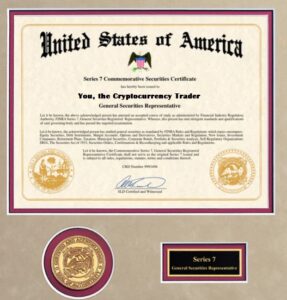Cryptocurrency Licenses
For Individuals
Licenses for Individuals in the Cryptocurrency Industry
Is anyone at your business buying or selling cryptocurrency on behalf of someone else? Is anyone giving advice regarding cryptocurrencies? Are you? One or more licenses may be needed.
There are a number of government agencies that enforce, or can penalize your business for being unlicensed. These include:
SEC the Securities and Exchange Commission
FINRA Financial Industry Regulatory Agency
FINRA refers to registered individuals as either “registered representatives,” or “associated persons.” The likelihood of a regulatory enforcement action against your business remains low at this time.
What Are the Penalties for Trading Cryptocurrency Without a License?
The Licensing of securities brokers, representatives, and advisors is governed by the Investment Advisors Act of 1940 (15 U.S.C. 77h-1). The statute comes with a number of penalties, which include:
Order
Cease and Desist Order [section 77h-1(a)]
Seizure
Seizure of Assets [section 77h-1(c)]
Five (5) Years
Up to Five (5) Years in Federal Prison
$10,000.00
Up to $10,000.00 in first tier fines [a “civil penalty” under section 77h-1(g)(2)(A)]
$100,000.00
Up to $100,000.00 in first tier fines for an entity [a “civil penalty” under section 77h-1(g)(2)(A)]
$75,000.00
Up to $75,000.00 in second tier fines [a “civil penalty” under section 77h-1(g)(2)(B)]
$375,000.00
Up to $375,000.00 in second tier fines for an entity [a “civil penalty” under section 77h-1(g)(2)(B)]
$150,000.00
Up to $150,000.00 in third tier fines [a “civil penalty” under section 77h-1(g)(2)(C)]
$725,000.00
Up to $725,000.00 in third tier fines for an entity [a “civil penalty” under section 77h-1(g)(2)(C)]
Investors Care Whether You Are Licensed
Your Customers Care Whether You Are Licensed

Some customers care whether you are properly licensed. Illegal business partners increase their risk. Other customers may not “care” but are impressed. Being licensed gives your business a competitive advantage. Failing to have legally required licenses carries reputation risks. The real importance of being licensed will appear when a conflict occurs!
-
What if a customer loses big money during a “crypto winter” and blames you?
-
What is a “complainer” customer (you know the type) is looking for leverage?
-
What if a lawsuit occurs and the lawyers discover you are operating without a legal license?
-
What if a competitor wants an easy way to rid itself of your advantages?
Do not give those who plot against your business an easy weapon to use against you. Get the proper licenses. It is achievable and relatively inexpensive.
Banks Care Whether You Are Licensed
All cryptocurrency companies carry the risk burden of the crypto industry. Many cryptocurrency companies carry the added banking risk of being considered money transmitters. Banks are not excited about servicing any crypto. This is because of the added regulatory burdens and costs imposed upon banks by the law and regulators.
Failing to have the needed state and national licenses to conduct business gives any bank an “easy out” to cancel the business. This is not an easy or quick fix should this occur.

The S.E.I. – Securities Industry Essentials
The SEI is the GED of the financial industry. It is a basic level examination for security industry professionals.
-
Section 1 of the SEI covers your basic knowledge of the capital markets. This know how includes regulatory entities, market participants, market structure, economics, and offerings.
-
Section 2 of the SEI tests your basic knowledge of financial products and their risks. Financial products covered include equities (securities/stocks), debt instruments (loans), options, packaged products (combinations), municipal securities (debts of governmental entities), DPPs, REITS (real estate investment trusts), Hedge funds (private investment entities), ETPs, and investment risk.
-
Sections 3 of the SEI discovers your basic knowledge of trading, customer accounts, and prohibitions. Trading includes market orders, limit orders, stop orders, good-til-canceled orders, discretionary orders, solicited orders, unsolicited orders. Customer accounts include cash accounts, margin accounts, option accounts, and educational accounts. Customer accounts includes fee based and commission based contracts, the many different customer types and anti-money laundering. SEI section 3 areas of prohibitions is interesting. It covers pump and dump schemes, front running, excessing trading (churning) freeriding, backing away, insider trading, IPOs, and the other schemes that plague the cryptocurrency field.
-
Section 4 of the SEI tests your knowledge of your regulatory requirements and the conduct of employees at your company. You will have to undergo a FINRA background check. You will have to file a Form U4 (Uniform Application for Securities Industry Registration). You will be fingerprinted. You will have yearly continuing education.
The Securities Industry Essentials exam is basic knowledge any trader or adviser should know. Having the SEI certification is a minimum for many crypto fintech professionals.
The Series 6 Examination – Not Particularly Important for Crypto Professionals
Someone with a Series 6 license is known as an Investment Company and Variable Contracts Products Representative. The Series 6 examination is unlikely to be useful for a cryptocurrency company. Series 6 professionals deal with:
Mutual funds
Variable annuities
Variable life insurance
UITs – Unit Investment Funds
The Series 6 exam lasts only ninety minutes. It costs a mere forty dollars. However, it is unlikely necessary for a crypto business.
The Series 7 License – Needed for Cryptocurrency Securities

Many crypto assets are expected to be labeled investment contracts, aka securities. This means these crypto will be regulated by the SEC. Any person using someone else’s assets to buy and sell crypto should consider obtaining a series 7 examination. Anyone giving advise on buying or selling crypto would be similarly wise with a series 7 certification.
The series 7 is part of the General Securities Representative registration, and follows up the SEI examination. The series 7 examination allows trading in nearly every type of security with the exception of commodities (series 3).
One should expect the series 7 examination to include many types of securities subjects. These include; Public stocks, Public bonds, Private stock, Private bonds, Government securities, Mutual funds, Money market funds, ETFs, UITs, REITs, Hedge funds, DPPs,
The Series 7 also tests an individuals knowledge on subjects related to the trading of these securities. Related tested subjects on the Series 7 include Securities traders, options on mortgage backed securities, venture capital, rights, warrants, repossessions, certificates on accrual on government securities, and mutual securities. The series 7 examination lasts four long hours. It costs over $245.
The Series 3 Examination – Needed for Cryptocurrency Commodities
Many in the crypto industry advocate that cryptocurrencies are commodities. Even the Chairman of the SEC has indicated some cryptocurrencies (like Bitcoin) are likely to be labeled commodities. It is anticipated that utility tokens will be commodities. Much of this is likely a result of a desire by blockchain advocates wanting regulatory enforcement of the CFTC (Commodities and Futures Trading Commission) rather than the SEC. The Series 3 will be needed, in either event.
The Series 3 examination is known as the “National Commodities Futures Exam.” It is administered by FINRA, lasts two and a half hours, and costs $130.
The Series 57 Examination – Is Getting a License to Trade Security Cryptocurrency an Unattainable Goal?
The Securities Trader Representative Exam is known as the Series 57. It is run by FINRA. Series 57 professionals can boast certified competency in the critical functions of a securities trader representative (at least on an entry level) . These competencies include:
Equity Transactions (potentially cryptocurrency trading)
Preferred Debt Transactions
Convertible Debt Transactions (present in many startup blockchain businesses)
Securities transacted on proprietary exchanges (ATS)
-
Obtain a FINRA member sponsor (a firm or applicable self-regulatory organization (SRO)) (120 days to pass the Series 57 after getting a sponsor)
-
Pass the Series 57 Exam
-
Pass the Securities Industry Essentials Exam
Expect forty-one questions relating to trading activities and nine questions relating to records maintenance, trade reporting, clearance, and settlement. Once there, you can call yourself a FINRA registered securities trader representative.
The FINRA Sponsor Problem:
Obtaining a FINRA sponsor is potentially unobtainable for cryptocurrency traders seeking Series 57 registration. FINRA oversees cryptocurrencies that are also securities. Utility tokens are handled by affiliate entities, if at all. In order to be listed on a large crypto exchange, tokens typically hire a crypto lawyer to analyze the blockchain cryptocurrency, draft a “token letter” setting out its attributes, and often concluding the blockchain token is not a security. FINRA monitors the crypto-related activities of its members. Therefore, a FINRA member increases its oversight and increases its risk by sponsoring a potential cryptocurrency securities trader. FINRA member firms are reluctant to sponsor anyone for the Series 57 exam, seeing a disproportionate downside to any crypto trading benefit. One sees few registered cryptocurrency securities traders for these reasons.
The Series 63 Examination – Needed for Cryptocurrency Securities and Commodities
There are several state law examinations that work in tandem with the national SEI, Series 7, and Series 3 tests. The Series 63 is the first of the State licenses. It is known as the Uniform Securities State Law Exam. The Series 63 is run by NASAA (North American Securities Administrators Association) and covers:
Stocks
Bonds
Mutual Funds
Annuities
The Series 63 exam is not independently held. One needs to have passed the Series 6/7 license as well. Where the Series 6 and 7 focus on the attributes and behavior of various types of investments, the Series 63 focuses on ethical and fiduciary responsibilities. The Series 63 consists of sixty scored questions. A 72% or higher is needed to pass. It costs $147 and lasts seventy five minutes.
Several states do not require the Series 63 examination. These are:
Colorado,
Florida,
Louisiana,
Maryland,
Ohio,
The District of Columbia, and
Puerto Rico.
The Series 65 Examination – Needed for Cryptocurrency Investment Advisors
Does your crypto business give advice to its customers? Does your business charge some sort of fee for that advice? Then the Uniform Investment Adviser Law Examination may be needed. One important aspect of having the Series 65 certificate is that you become a fiduciary. You must give advice to your clients that is in the clients’ best interest, irrespective of whether it benefits or harms you. The topics of the Series 65 include:
Economic factors
Business information
Client investment recommendations
Client investment strategies
Laws and Regulations
Guidelines for investment advice
Prohibited advice
Unethical business practices
The Series 65 examination is also ran by the NASAA. There are 130 multiple choice questions. Ninety-four correct answers will be needed to achieve the Series 65 72% passage requirement. It takes three hours to complete and costs $187. Those passing the Series 65 may refer to themselves as an IAR, or Investment Advisor Representative.
The Crypto Lawyers at Whale.Law represent blockchain and crypto businesses. We add value. We reduce risk. Contact us if we can help your business.
Let's Discuss what you are trading, where you are trading, and with whom you are dealing.


Trial lawyer Matt Hamilton graduated from the University of Missouri – Columbia in 1995 with Science degrees in Logistics, Marketing, and Business Administration.
Matthew J. Hamilton Juris Doctor & Crypto Lawyer